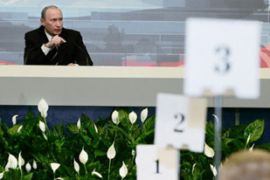Putin promises free elections
The Russian president says he has “no appointed successor” for 2008 elections.

Published On 1 Feb 2007
Putin established the event in 2001 as an annual address to the nation.
In the conference Putin said: “There will be no appointed successor. There will be candidates running for election.”
Putin’s second and final term is due to expire next year, but he remains the most popular politician in the country and it is anticipated that his “choice” of candidate will be elected.
Political institutions “emasculated”
Masha Lipman, a political expert at the the Carnegie Endowment for International Peace, told Al Jazeera in an interview: “Putin is the ultimate arbiter of the Kremlin’s feuding factions. It’s very important that who ever replaces him has his blessing because he is by far the most popular politician in the country.”
Lipman said: “About 40 per cent are ready to vote for whatever candidate Valdimir Putin puts forward.”
She said: “All political institutions except for the presidency have been emasculated.”
Putin has repeatedly promised to step down on time, but has suggested he will retain an important future role.
He said he hoped his successor in the Kremlin would “consolidate” his achievements.
Putin talked at length about the Russia’s economic growth and addressed the criticism Russia has received from other counties which have accused Russia of using its energy resources as a political weapon.
“We are always told that Russia is using its … economic resources to achieve its foreign policy aims. This is not the case,” Putin said.
Russia’s campaign to increase gas and oil prices, and its disputes with the Ukraine and more recently with Belarus, have caused disruptions to supply in Europe and raised fears of energy shortages.
Putin also said it was important to “narrow the gap between wage earners”.
 |
|
Politkovskaya, a critic of Putin, was murdered |
He said that, although Russia’s GDP had reached $1 trillion last year, the priority was still to raise living standards and narrow the income gap between rich and poor.
“Everything has to be subordinated to raising living standards and the quality of life,” Putin said.
Russia’s post-Soviet Union transition to capitalism has created huge disparities in wealth, with billionaire businessmen in the cities and dirt-poor peasants in shrinking villages.
Critics murdered
He also talked about corruption and the need to improve press freedom in Russia, saying that Russian citizens should all play a much larger role.
“We want all citizens, including in faraway regions, to feel that they are connected to their country’s life,” he said.
“We know that the authorities are often criticised for limiting the way the media operate. But people also criticise mass media, that their coverage is not in line with people’s expectations.”
Putin came under criticism last year after the murders of two of his critics – Anna Politkovskaya, an investigative journalist, and Alexander Litvinenko, a former Russian agent.
Politkovskaya was the 13th journalist believed to have been murdered for her work since Putin took power in 2000, while Litvinenko, who died in November last year, accused the Russian leader of ordering his radiation poisoning, a charge the Kremlin has rejected.
Source: Al Jazeera, News Agencies